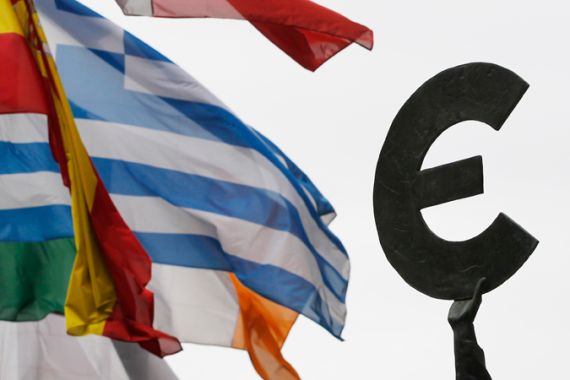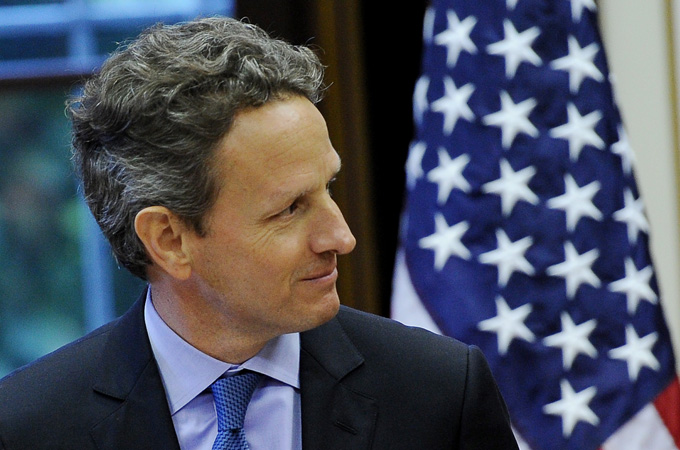What happens in Europe doesn’t stay in Europe
The debt crisis in the eurozone is far from ‘just a European affair’, author says.

 |
| US Treasury Secretary Timothy Geithner has been lobbying heavily for US interests behind the scenes [EPA] |
New York, New York – Some years back, the Comedy Channel featured a map illustrating how most Americans see the world. The biggest part of it was pictured as “US”; the rest of the world was shown as “THEM”.
This may be true of public understanding – in part, because of the way our media works or doesn’t work – but it’s not true of the way our government operates as an often stealth force in global affairs.
Keep reading
list of 4 itemsInside the pressures facing Quebec’s billion-dollar maple syrup industry
Manipur’s BJP CM inflamed conflict: Assam Rifles report on India violence
Marcos Jr treads fine line with China as Philippines deepens US, Japan ties
| Inside Story – Saving the euro |
For many, the crisis in Europe resembles the saying “What Happens in Vegas Stays in Vegas” – they see it as a clash of countries rather than currencies or interests, ignoring America’s omnipresent financial presence and role in a number of Europe’s problems that were undeniably made worse by irresponsible spending on every level.
In fact, it was American firms and banks that shovelled many of the loans into European countries that they are struggling to pay back. It was they who encouraged Europe’s banks to take on much of the very debt that they are now complaining about.
American companies also encouraged Europe’s financial institutions to invest in fraudulent subprime loans and derivatives that cost them billions.
That’s why some on the Continent were blaming the US for exporting a type of “financial AIDS”, or likening the economic collapse to financial terrorism. Now that so many of these deals collapsed, plunging Europe into crisis, the US is working in a shadowy manner to put “Humpty Dumpty” back together.
As the Washington Post reports:
“Senior US officials are playing a behind-the-scenes role in efforts to contain the European debt crisis, cajoling the region’s leaders to take more steps to calm markets and trying to mediate among European governments with competing interests.
“US officials have served at times as a quiet intermediary between European political leaders and the powerful European Central Bank, which tries to stay out of the political fray. In particular, according to US officials, Americans have passed along information about how much money European governments might be willing to contribute to a rescue fund, a crucial question for the central bank as it considers its actions.”
It is not just the government that is meddling here, but also the powerful Federal Reserve Bank, which many Europeans think of as a government institution when it is actually run by privately-held US banks and operates in their interest. (It too operates secretly, but was just forced to reveal that it loaned a whopping $17.7tr in 2008 to save many banks, some of which were in Europe.)
The Post reveals:
“…top Federal Reserve officials, including Chairman Ben S Bernanke and New York Fed chief Bill Dudley, along with counterparts at the Bank of England, initiated talks over how to prevent Europe’s debt problems from spiralling into a global banking crisis, the officials said. The discussions culminated in a Thanksgiving morning conference call among the world’s leading central bankers during which they agreed to announce joint action to ensure that banks around the world, and especially in Europe, have access to dollars at cheap rates.”
So while Americans were sitting down for their turkey dinners, US bankers were talking turkey with their counterparts in Europe, telling them what to do as covertly as possible. That’s why this Thanksgiving encounter went largely unreported.
American politicians have try to play crisis manager too. As far as we known, President Obama has made nine calls to European leaders that we know about using his bully pulpit to strong arm them.
“I’m spending an awful lot of time making transatlantic calls”, he disclosed at a New York fundraiser.
In addition, US Treasury Secretary Timothy Geithner has been meeting regularly with European Central bankers in Basel, Switzerland, and elsewhere. He has been burning up the phone lines too, lobbying for US-backed policies. He has now been sent on a tour of five European countries, while his underlings press the flesh and US ambassadors join an on-the-ground TEAM USA to lobby local politicians.
What’s behind this full court press?
It’s simple: What happens in Europe today will impact what happens in the US tomorrow.
As the AP reports:
“A still-fragile US economy remains vulnerable to any financial contagion that might erupt in Europe. If banks that are sitting on piles of European government debt cut off lending, the global economy would suffer. The flow of US exports would slow. A panic could send stocks tumbling worldwide. And with Obama facing re-election in less than a year, the outcome of Europe’s crisis carries risks for the president personally.”
The US is not just another country: Washington effectively controls the IMF and World Bank. Its banks, loans, and investments are all over the Continent.
All of this overt and covert pressure is, of course, always justified by the altruistic motivation of building a “Stronger Europe”. Yet, of course, US interests come first.
Economist Michael Hudson, once with Chase Bank, says that in private American officials are open about their self-interests, and talk tough about US exposure to this crisis:
“Mr Geithner explained to the Europeans that the largest insurers of the Greek debt are American money market funds and hedge funds. And he said American hedge funds and banks would lose money and actually would crash the U.S. economy, if Europe made a concession to Greece to bring debts down to the ability to pay. So, instead of a debt write-down or a haircut, the banks said, ‘OK, we will agree with what the Americans are insisting on, and we will ask for a voluntary write-down by the banks on the Greek debt they hold.'”
Obviously, European banks who are not part of the credit default swaps have disagreed with this. Americans are therefore putting immense pressure on Europe, saying, “We will wreck your economy, if you don’t wreck Greece’s economy”.
Many Europeans are pissed off at all this strong-arming, especially when Washington did not take Europe’s advice when the crisis began. Back then, French Finance Minister and IMF managing director Christine Lagarde begged American officials to step in and save Lehman Brothers from a bankruptcy that has since destabilized its former counterparties in European institutions.
The problem is that the bankers speak for bankers, not the public – they are not fully accountable for their actions or transparent about their practices. Clearly, European politicians have been in league with domestic and international economic interests that have helped them pile up debt and tolerated overspending with little criticism until their economies went into a free fall.
On top of pervasive fraud and white collar crime, Europe was basically functioning as a kleptocracy, not a democracy, a fact that no one is really investigating even as the West plays clean up.
In a telling comment on Michael Hudson’s analysis, a financial pro writes anonymously:
“Greece hints at the total political corruption engineered by the kleptocratic enterprise. Where it is not just the whole of the Greek political Establishment, but the European Establishment above them, and the American political Establishment above that.”
Everyone is involved: The crisis is not just a European affair, nor can it be resolved there. And its full impact has yet to be felt.
News Dissector Danny Schechter made the film Plunder about Wall Street crime.
Follow Danny Schecter on Twitter @DISSECTOREVENTS.
The views expressed in this article are the author’s own and do not necessarily reflect Al Jazeera’s editorial policy.
